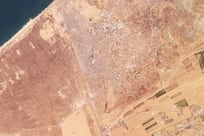New York // Pressure is mounting on the White House to intervene forcefully in Syria's civil war after the Obama administration said chemical weapons were probably used by regime forces against rebels.
But in comments before meeting King Abdullah II of Jordan in Washington last night, the US president Barack Obama said intelligence assessments of chemical arms use were preliminary.
He promised a vigorous investigation by the US on its own, and with the UN.
Politicians from both parties in the US Congress voiced impatience with the lack of action, saying "red lines" on the use of chemical weapons set by Mr Obama in August have been crossed.
"It is clear that red lines have been crossed and action must be taken to prevent larger-scale use," said Dianne Feinstein, the Democratic chairwoman of the Senate intelligence committee.
Mr Obama said last night that the use of "potential weapons of mass destruction on civilian populations" would be a "game changer", but advised proceeding with caution.
"We have to act prudently," he said. "We have to make these assessments deliberately. But I think all of us recognise how we cannot stand by and permit the systematic use of … chemical weapons on civilian populations."
Chuck Hagel, the US defence secretary, said in Abu Dhabi on Thursday that the White House had sent a letter to congressmen stating the intelligence community assessed "with varying degrees of confidence" the Syrian regime had used chemical arms.
In particular, the letter said, it used the nerve agent sarin gas.
Similar allegations were made by key allies Britain, France, Qatar and Israel.
Two instances of small-scale chemical weapons attacks are thought to have occurred around March 19 in Aleppo and a suburb of Damascus, a US official said.
Citing Iraq and fears of inadvertently arming militants with links to Al Qaeda, Mr Obama has so far resisted pressure from international allies and Democratic and Republican politicians for US military involvement to end to the conflict, which has left at least 70,000 dead.
The administration reiterated its support for a United Nations investigation into chemical weapons use, but the UN team has so far been barred from entering Syria.
US officials also said they were working with the Syrian opposition to gather evidence that would allow them to make an informed decision.
But US politicians have voiced impatience with the administration's cautious response, warning that by not following through on his threats, Mr Obama risked undermining US credibility.
"I am deeply concerned with reports that further confirmation of use may be outsourced to the United Nations," said Republican congressman John Boehner. "If Assad sees any equivocation on the red line, it will embolden his regime."
Republican senator John McCain said: "I think it's pretty obvious that that red line has been crossed.
"Now I hope the administration will consider what we have been recommending for over two years of this bloodletting and massacre, and that is to provide a safe area for the opposition to operate, to establish a no-fly zone and provide weapons to people in the resistance who we trust."
The Pentagon has prepared a range of options for Mr Obama to consider, including raids by special forces to secure chemical weapons stockpiles, cruise-missile strikes on Syrian fighter planes from nearby warships or drones, and establishing a no-fly zone.
Stepping up what has so far been only non-lethal aid to vetted rebels is another option discussed. But it is unclear how effective any of these options would be.
"The options are all bad," said Aram Nerguizian, a senior fellow at the Centre for Strategic and International Studies. "Arming the opposition doesn't do anything regarding chemical weapons or solving proliferation concerns in Syria."
Mr Nerguizian added that targeting chemical-weapons plants alone would do little to dictate the outcome of the civil war.
Gen Martin Dempsey, the chairman of the Joint Chiefs of Staff, was asked during a congressional hearing last week whether he was confident that US forces could secure the chemical weapons caches within Syria.
"Not as I sit here today, simply because they've been moving it and the number of sites is quite numerous," Gen Dempsey said.
David Reeths, director of IHS Jane's Consulting, said securing the weapons would require an "extremely complex" operation and "would almost certainly require a significant in-country presence for an extended period of time".
The US military has made it clear that any intervention would be done with Nato backing or with a coalition of allied nations, similar to the intervention in the Libyan civil war in 2011.
* With reporting by Associated Press and Reuters




